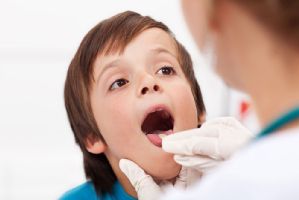
Ear Pain, Drainage, and Infections
Author: Nicole Marty, MD
My child is having pain in her ear/ears, what could be causing this?
The two most common causes of ear pain in children are ear infections and fluid behind the eardrum which is not infected. Ear pain may also be caused by an infection of the outer part of the ear (called swimmer's ear). Rarely, ear pain can be from a tooth or jaw problem, or if your child has something stuck in their ear canal. Sometimes, children complain of pain in the ear although there is no problem that a doctor can see. It's a very sensitive area, and sometimes children complain of pain for no particular reason.
My child is pulling/touching/rubbing ears, does that mean they have an ear infection?
Rubbing/touching the ears is very common in younger children. Simple ear pulling/tugging or touching without other symptoms such as crying or fever is harmless. These children rarely have an ear infection. If the child continues to rub or touch the ear frequently for greater than 3-5 days you should call our office during office hours at (715) 830-0732.
What are the signs of an ear infection?
- Pain in the ear
- Act fussy (babies or young children)
- Pulling at ears (this alone is usually not a sign of ear infection, must be seen with other symptoms)
- Fever
- Drainage from ear(s)
- Having trouble sleeping at night
It is important to remember that just because a baby is fussy and pulling at her ears does not mean it is an ear infection. The only way to diagnose an ear infection is to look in the ear, you cannot diagnose ear infections on symptoms alone.
What are the signs of swimmer's ear?
Mild signs include:
- Itching and/or slight discomfort in the ear canal
- Redness of the ear canal
- Drainage of clear fluid that does not smell
- Pain which is made worse by pulling or pushing on the outer ear
Moderate signs include
- More intense itching and pain
- Increasing redness of the ear
- Excessive fluid drainage, or drainage which is yellow/green (pus)
- Decrease or muffled hearing
Severe signs include:
- Severe pain which may radiate to the face, neck or side/top of the head
- Complete blockage of the ear canal
- Redness or swelling of the outer ear
- Lymph node swelling in your child's neck
- Fever
*If you note any severe signs, your child needs to be seen by a doctor right away.
If I suspect that my child has an ear infection, do they need to be seen by a doctor right away?
Not necessarily. Often times, ear infections are caused by viruses and will go away without treatment. Remember, antibiotics do not treat viruses and will not make an ear infection which is caused by a virus to get better. Studies have shown that anywhere from 60-80% of ear infections will clear without any medication or treatment.
If your child has the following signs or symptoms, you should bring them to see their regular doctor (or Urgent care or emergency department if it is after office hours or on the weekend). If it is during regular office hours, we prefer that you call our office at 715-830-0732 to schedule an appointment to be seen:
- Your child is under 6 months of age and you suspect that they have an ear infection.
- Your child seems severely ill.
- Pain is moderate to severe and a dose of ibuprofen/Tylenol does not decrease the pain.
- Your child is lethargic (not easy to wake up, won't take a bottle or drink fluids)
- Your child is dehydrated (no urine in 8 hours, dry mouth, no tears when she cries).
- Your child has blood or pus coming out of his or her ear.
If you suspect that your child has an ear infection, is over the age of 6 months and is otherwise doing fine, you can give ibuprofen or Tylenol to control the pain and wait until you can be seen at OakLeaf Pediatrics on the next business day. Even if it the weekend, if your child is doing ok, you can continue to monitor your child and call us on Monday morning to make an appointment.
What should I do if I suspect that my child has swimmers ear but the office is not open?
If your child is having only mild symptoms and you are able to bring your child to our office the next day, you can give your child ibuprofen or Tylenol and call us the next day at 715-830-0732 to schedule an appointment (we open the phone lines at 8 am, call us as soon as you can). If symptoms are moderate to severe, you should bring your child in to be seen urgently (if it is not during office hours, you can bring your child to urgent care).
What can I do at home to help my child feel better?
- Tylenol or ibuprofen dosed according to your child's weight (dosing charts are located under "helpful links and documents" on our after-hours page. This is the most helpful in decreasing pain.
- Cool or warm compresses - soak a washcloth in either cool or warm water, wring it out and then put it over the ear that bothers the child. Try both temperatures and see which one your child likes best.
- Sleep upright - prop your child up in bed with pillows or sleep with them in an armchair that's slightly reclined. This may help to decrease pain and encouraged fluid in the ear to drain out.

Related Articles

Pediatric Medicine
Strep/Sore Throat
My child has a sore throat, how do I know if it is strep throat? It is important to remember that...

Pediatric Medicine
Fever FAQ
Most of the time, fever is not a medical emergency and can wait until the next morning to be seen in...

Pediatric Medicine
Rash after Fever
Fever followed by a rash is common in children. The most common cause is a viral illness called...

Pediatric Medicine
Diarrhea and Vomiting
Vomiting and diarrhea are common in childhood and are most often caused by a viral infection....
